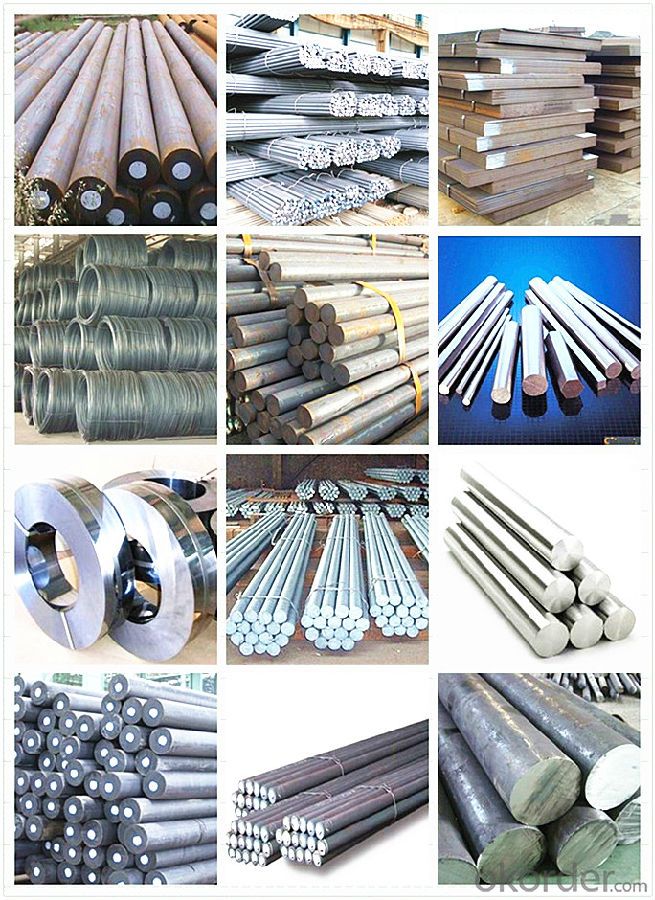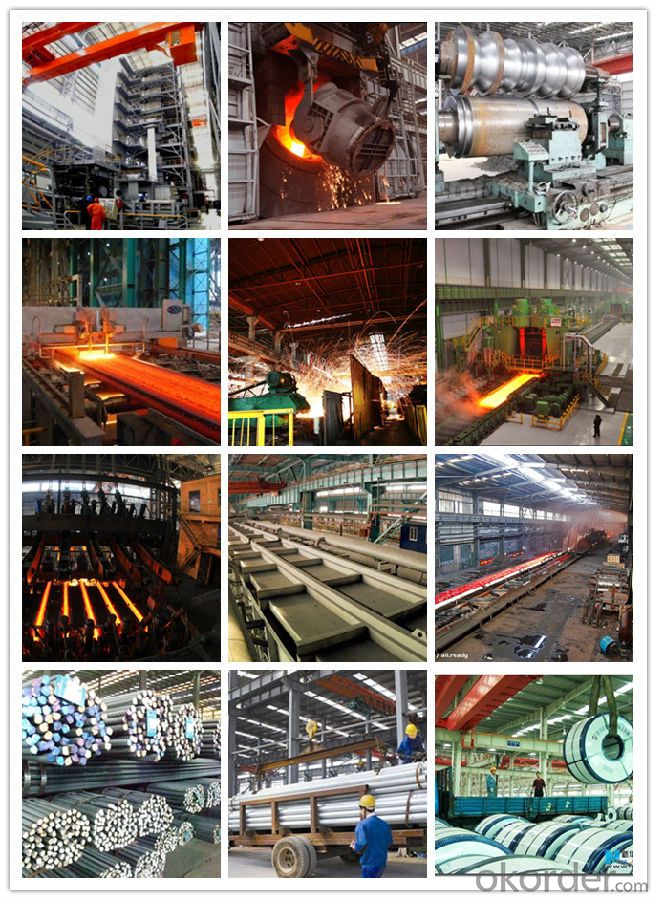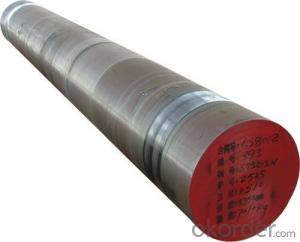Alloy Steel Spring Steel Round 65Mn Forged Steel
- Loading Port:
- China main port
- Payment Terms:
- TT OR LC
- Min Order Qty:
- 30 m.t.
- Supply Capability:
- 10000 m.t./month
OKorder Service Pledge
OKorder Financial Service
You Might Also Like
Item specifice
Product information:
Specification
| Product: | hot rolled spring steel coil strip 65mn, 1566 |
| Technique of production: | hot rolling , no annealing ,acid pickling |
| Productivity: | 300,000 Tons/year |
| Thickness: | 0.75-200mm |
| Width: | 914-2000mm |
| Coil Weight: | 3-10 Tons |
| Inside Diameter: | 508mm Or 610mm |
| Outside Diameter | 1000-1500mm |
| Standard: | ASTM A36, JISG3101, EN10025, ISO630, GB/T |
| Surface: | Light oil, without oil |
| Package: | Export standard package or as request |
| Application | Widely used in ships, automobiles, bridges, buildings, machinery, boilers, pressure vessels and other manufacturing industries |
Product Show:

Workshop Show:

Shipping
1. FedEx/DHL/UPS/TNT for samples, Door-to-Door;
2. By Air or by Sea for batch goods, for FCL; Airport/ Port receiving;
3. Customers specifying freight forwarders or negotiable shipping methods!
Delivery Time: 3-7 days for samples; 5-25 days for batch goods.
Payment Terms
1.Payment: T/T, L/C, Western Union, MoneyGram,PayPal; 30% deposits; 70% balance before delivery.
2.MOQ: 1pcs
3.Warranty : 3 years
4.Package Informations: 1) EXPORT, In 20 feet (GW 25 ton) or 40 feet Container (GW 25 ton)
2)as customer's requirement
Why choose us?
(1) The leading exporter in China special steel industry.
(2) Large stocks for various sizes, fast delivery date.
(3) Good business relationship with China famous factories.
(4) More than 7 years steel exporting experience.
(5) Good after-sales service guarantee.
- Q:What are the properties of wear-resistant stainless steel?
- Wear-resistant stainless steel possesses several key properties that make it a highly durable and reliable material. Firstly, it has a high hardness level, which helps it withstand abrasion and wear caused by friction. Secondly, it exhibits excellent corrosion resistance, protecting it from rust and other forms of degradation. Additionally, wear-resistant stainless steel has a high tensile strength, allowing it to withstand heavy loads and impacts without deforming or breaking. Lastly, it maintains its properties at elevated temperatures, making it suitable for use in high-temperature environments. Overall, these properties make wear-resistant stainless steel an ideal choice for applications that require strength, durability, and resistance to wear and corrosion.
- Q:What are the different applications of high-speed special steel?
- High-speed special steel is a type of steel specifically designed to endure high temperatures and maintain its hardness at high speeds. Its exceptional properties make it suitable for a wide range of applications in various industries. Some of the diverse uses of high-speed special steel include: 1. Cutting Tools: In the manufacturing of drills, milling cutters, taps, and saw blades, high-speed special steel is extensively employed. Its outstanding hardness, heat resistance, and wear resistance make it perfect for machining operations involving high temperatures and high-speed cutting. 2. Aerospace Industry: High-speed special steel is extensively utilized in the production of aircraft components in the aerospace industry. It is employed to manufacture turbine blades, engine parts, and other critical components that require exceptional strength, resistance to high temperatures, and excellent fatigue resistance. 3. Automotive Industry: The automotive industry incorporates high-speed special steel in the manufacturing of engine components, gears, and bearings. Its ability to endure high temperatures, resist wear, and provide strength makes it suitable for various automotive applications. 4. Power Generation: High-speed special steel is employed in power generation industries such as thermal power plants, nuclear power plants, and wind energy. It is used to manufacture turbine blades, rotors, and other components that operate at high temperatures and high rotational speeds. 5. Tool and Die Making: The tool and die making industry extensively utilizes high-speed special steel where precision and durability are crucial. It is employed to produce molds, dies, punches, and other tooling components that require exceptional strength, wear resistance, and toughness. 6. Medical Instruments: High-speed special steel is increasingly being used in the medical field to manufacture surgical instruments, dental tools, and implants. Its corrosion resistance, high strength, and biocompatibility make it suitable for medical applications. 7. Industrial Machinery: High-speed special steel finds applications in various industrial machinery such as bearings, gears, shafts, and cutting tools. Its ability to endure high temperatures, resist wear, and provide strength contributes to the efficiency and reliability of industrial equipment. In conclusion, high-speed special steel is a crucial material that finds numerous applications across industries. Its unique properties, including high temperature resistance, hardness, wear resistance, and strength, make it essential for cutting tools, aerospace components, automotive parts, power generation equipment, tool and die making, medical instruments, and industrial machinery.
- Q:What are the applications of special steel in the oil and gas industry?
- Special steel is widely used in the oil and gas industry due to its exceptional properties such as high corrosion resistance, strength, and durability. It is primarily utilized in the construction of pipelines, drill bits, and various equipment used in oil and gas exploration, extraction, and refining processes. Additionally, special steel is employed in the manufacturing of storage tanks, valves, and offshore platforms, providing reliable solutions for harsh operating conditions and ensuring the safety and efficiency of oil and gas operations.
- Q:Can special steel be used in the aerospace industry?
- Yes, special steel can be used in the aerospace industry. Special steel alloys, such as stainless steel and titanium alloys, possess excellent strength, corrosion resistance, and heat resistance properties required for aircraft components. These materials are commonly used in critical applications like engine parts, landing gears, and structural components to ensure high performance and safety in aerospace operations.
- Q:What are the different methods for improving the electrical conductivity of special steel?
- There are several methods for improving the electrical conductivity of special steel, including alloying, heat treatment, and surface modifications. Alloying involves adding elements like copper, nickel, or silver to the steel to enhance its conductivity. Heat treatment processes such as annealing or quenching can also improve conductivity by altering the microstructure of the steel. Additionally, surface modifications like electroplating or coating can be employed to enhance electrical conductivity.
- Q:How does special steel contribute to the chemical processing industry?
- Special steel plays a crucial role in the chemical processing industry by offering a wide range of benefits that contribute to the overall efficiency and safety of various processes. Firstly, special steel is highly resistant to corrosion, which is an essential characteristic when dealing with corrosive chemicals. This resistance ensures that equipment and pipelines made from special steel can withstand the harsh chemical environments without deteriorating, leading to increased longevity and reduced maintenance costs. Furthermore, special steel provides excellent strength and durability, allowing it to withstand high temperatures and pressures commonly encountered in chemical processing. This strength ensures that equipment such as reactors, heat exchangers, and vessels can operate effectively under demanding conditions, minimizing the risk of failures or accidents. Special steel also offers excellent thermal conductivity, which is highly advantageous in heat transfer applications. This property allows for efficient heat exchange between different fluids, enhancing the overall energy efficiency of chemical processes. By facilitating the effective transfer of heat, special steel aids in optimizing the performance of equipment like condensers, boilers, and evaporators. In addition, special steel is often used in the construction of storage tanks and pipelines for the transportation and distribution of chemicals. Its high resistance to mechanical stress and impact makes it ideal for ensuring the safe containment and transportation of hazardous substances, reducing the risk of leaks or spills that could have serious environmental and safety consequences. Overall, the use of special steel in the chemical processing industry greatly contributes to the reliability, efficiency, and safety of various processes. Its corrosion resistance, strength, thermal conductivity, and durability make it an indispensable material for equipment and infrastructure, ensuring the smooth and secure operation of chemical processing plants.
- Q:What are the main factors affecting the toughness of special steel?
- The main factors affecting the toughness of special steel are its composition, microstructure, and heat treatment. Composition plays a crucial role in determining the toughness of special steel. The presence of certain alloying elements such as chromium, molybdenum, nickel, and vanadium can enhance the toughness of steel. These elements form solid solutions or precipitates in the steel matrix, which impede the propagation of cracks and improve the material's resistance to fracture. Microstructure also plays a significant role in determining the toughness of special steel. The size, shape, and distribution of the various phases in the steel, such as ferrite, pearlite, bainite, and martensite, affect its toughness. Fine-grained microstructures typically exhibit higher toughness due to their increased resistance to crack propagation. Heat treatment is another essential factor in controlling the toughness of special steel. The process of heating and cooling the steel can modify its microstructure, altering its toughness. Quenching, tempering, and annealing are common heat treatments used to improve the toughness of steel. Quenching and tempering, for example, can produce a microstructure with a desirable balance of hardness and toughness. Other factors that can affect the toughness of special steel include the presence of impurities, non-metallic inclusions, and the presence of residual stresses. Impurities and inclusions can act as stress concentrators and reduce the toughness of the steel. Residual stresses, which can arise during manufacturing processes, can also impact the toughness of the material by creating regions of high stress that can initiate crack formation. In summary, the composition, microstructure, heat treatment, presence of impurities and inclusions, and residual stresses are the main factors affecting the toughness of special steel. Understanding and controlling these factors are crucial for optimizing the toughness and performance of special steels in various applications.
- Q:What are the factors that affect the machinability of special steel?
- There are several factors that can affect the machinability of special steel. First, the composition of the steel, including the type and amount of alloying elements present, can significantly impact its machinability. Additionally, the hardness and microstructure of the steel, which are influenced by factors such as heat treatment and processing, can also affect how easily it can be machined. Other factors that can play a role include cutting tool selection, cutting speed, feed rate, and coolant or lubricant used during machining.
- Q:Can special steel be used in the manufacturing of household appliances?
- Certainly, household appliances can indeed be manufactured using special steel. Also known as alloy steel, special steel possesses a range of desirable attributes such as exceptional strength, durability, and resistance to both corrosion and wear. These characteristics render it suitable for a wide array of applications, including the production of household appliances. When it comes to household appliances like refrigerators, ovens, dishwashers, and washing machines, it is essential to utilize materials that can endure constant utilization, high temperatures, as well as exposure to water and chemicals. Special steel fulfills these requirements and provides a dependable and long-lasting solution. To exemplify, stainless steel represents a common type of special steel employed in household appliances due to its resistance to corrosion and hygienic properties. It finds application in various appliance components such as refrigerator doors, oven interiors, and dishwasher interiors. Stainless steel is easily cleaned, maintains its appearance over time, and does not react with food or other substances, making it an ideal selection for household appliances. Moreover, special steel alloys can be employed to enhance specific properties required in different appliances. For instance, heat-resistant alloys can be utilized in ovens or stovetops, while high-strength steel alloys can be employed in appliances necessitating structural integrity, such as washing machines or dryers. In conclusion, special steel can certainly find use in the manufacturing of household appliances. Its diverse properties, encompassing strength, durability, corrosion resistance, and versatility, make it a superb material choice for ensuring the performance, longevity, and safety of household appliances.
- Q:How does special steel contribute to the wear resistance of products?
- Special steel contributes to the wear resistance of products by offering superior hardness, strength, and durability compared to regular steel. Its unique composition, which may include additional alloying elements like chromium, nickel, or molybdenum, enhances its ability to withstand friction, abrasion, and other forms of wear. This enables products made from special steel to have a longer lifespan and perform effectively in demanding applications, reducing the need for frequent replacements and maintenance.
1. Manufacturer Overview |
|
|---|---|
| Location | |
| Year Established | |
| Annual Output Value | |
| Main Markets | |
| Company Certifications | |
2. Manufacturer Certificates |
|
|---|---|
| a) Certification Name | |
| Range | |
| Reference | |
| Validity Period | |
3. Manufacturer Capability |
|
|---|---|
| a)Trade Capacity | |
| Nearest Port | |
| Export Percentage | |
| No.of Employees in Trade Department | |
| Language Spoken: | |
| b)Factory Information | |
| Factory Size: | |
| No. of Production Lines | |
| Contract Manufacturing | |
| Product Price Range | |
Send your message to us
Alloy Steel Spring Steel Round 65Mn Forged Steel
- Loading Port:
- China main port
- Payment Terms:
- TT OR LC
- Min Order Qty:
- 30 m.t.
- Supply Capability:
- 10000 m.t./month
OKorder Service Pledge
OKorder Financial Service
Similar products
New products
Hot products
Related keywords






























